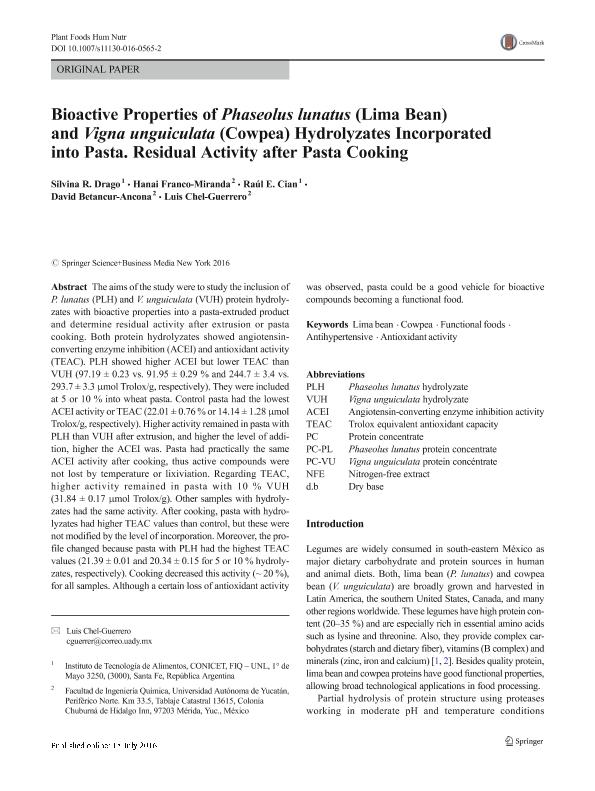Mostrar el registro sencillo del ítem
dc.contributor.author
Drago, Silvina Rosa

dc.contributor.author
Franco-Miranda, Hanai
dc.contributor.author
Cian, Raúl Esteban

dc.contributor.author
Betancur, Diela

dc.contributor.author
Chel-Guerrero, Luis
dc.date.available
2020-05-07T13:25:42Z
dc.date.issued
2016-07
dc.identifier.citation
Drago, Silvina Rosa; Franco-Miranda, Hanai; Cian, Raúl Esteban; Betancur, Diela; Chel-Guerrero, Luis; Bioactive Properties of Phaseolus lunatus (Lima Bean) and Vigna unguiculata (Cowpea) Hydrolyzates Incorporated into Pasta. Residual Activity after Pasta Cookin; Springer; Plant Foods for Human Nutrition; 7-2016; 1-7
dc.identifier.issn
0921-9668
dc.identifier.uri
http://hdl.handle.net/11336/104465
dc.description.abstract
The aims of the study were to study the inclusion of P. lunatus (PLH) and V. unguiculata (VUH) protein hydrolyzates with bioactive properties into a pasta-extruded product and determine residual activity after extrusion or pasta cooking. Both protein hydrolyzates showed angiotensinconverting enzyme inhibition (ACEI) and antioxidant activity (TEAC). PLH showed higher ACEI but lower TEAC than VUH (97.19 ± 0.23 vs. 91.95 ± 0.29 % and 244.7 ± 3.4 vs. 293.7 ± 3.3 μmol Trolox/g, respectively). They were included at 5 or 10 % into wheat pasta. Control pasta had the lowest ACEI activity or TEAC (22.01 ± 0.76 % or 14.14 ± 1.28 μmol Trolox/g, respectively). Higher activity remained in pasta with PLH than VUH after extrusion, and higher the level of addition, higher the ACEI was. Pasta had practically the same ACEI activity after cooking, thus active compounds were not lost by temperature or lixiviation. Regarding TEAC, higher activity remained in pasta with 10 % VUH (31.84 ± 0.17 μmol Trolox/g). Other samples with hydrolyzates had the same activity. After cooking, pasta with hydrolyzates had higher TEAC values than control, but these were not modified by the level of incorporation. Moreover, the profile changed because pasta with PLH had the highest TEAC values (21.39 ± 0.01 and 20.34 ± 0.15 for 5 or 10 % hydrolyzates, respectively). Cooking decreased this activity (~ 20 %), for all samples. Although a certain loss of antioxidant activity was observed, pasta could be a good vehicle for bioactive compounds becoming a functional food.
dc.format
application/pdf
dc.language.iso
eng
dc.publisher
Springer

dc.rights
info:eu-repo/semantics/openAccess
dc.rights.uri
https://creativecommons.org/licenses/by-nc-sa/2.5/ar/
dc.subject
LIMA BEAN
dc.subject
COWPEA
dc.subject
FUNCTIONAL FOODS
dc.subject
ANTIHYPERTENSIVE
dc.subject
ANTIOXIDANT ACTIVITY
dc.subject.classification
Alimentos y Bebidas

dc.subject.classification
Otras Ingenierías y Tecnologías

dc.subject.classification
INGENIERÍAS Y TECNOLOGÍAS

dc.title
Bioactive Properties of Phaseolus lunatus (Lima Bean) and Vigna unguiculata (Cowpea) Hydrolyzates Incorporated into Pasta. Residual Activity after Pasta Cookin
dc.type
info:eu-repo/semantics/article
dc.type
info:ar-repo/semantics/artículo
dc.type
info:eu-repo/semantics/publishedVersion
dc.date.updated
2020-05-04T20:50:13Z
dc.journal.pagination
1-7
dc.journal.pais
Alemania

dc.journal.ciudad
Berlin
dc.description.fil
Fil: Drago, Silvina Rosa. Universidad Nacional del Litoral. Facultad de Ingeniería Química. Instituto de Tecnología de los Alimentos; Argentina. Consejo Nacional de Investigaciones Científicas y Técnicas; Argentina
dc.description.fil
Fil: Franco-Miranda, Hanai. Universidad Autónoma de Yucatán; México
dc.description.fil
Fil: Cian, Raúl Esteban. Universidad Nacional del Litoral. Facultad de Ingeniería Química. Instituto de Tecnología de los Alimentos; Argentina. Consejo Nacional de Investigaciones Científicas y Técnicas; Argentina
dc.description.fil
Fil: Betancur, Diela. Universidad Autónoma de Yucatán; México
dc.description.fil
Fil: Chel-Guerrero, Luis. Universidad Autónoma de Yucatán; México
dc.journal.title
Plant Foods for Human Nutrition

dc.relation.alternativeid
info:eu-repo/semantics/altIdentifier/doi/http://dx.doi.org/10.1007/s11130-016-0565-2
Archivos asociados
